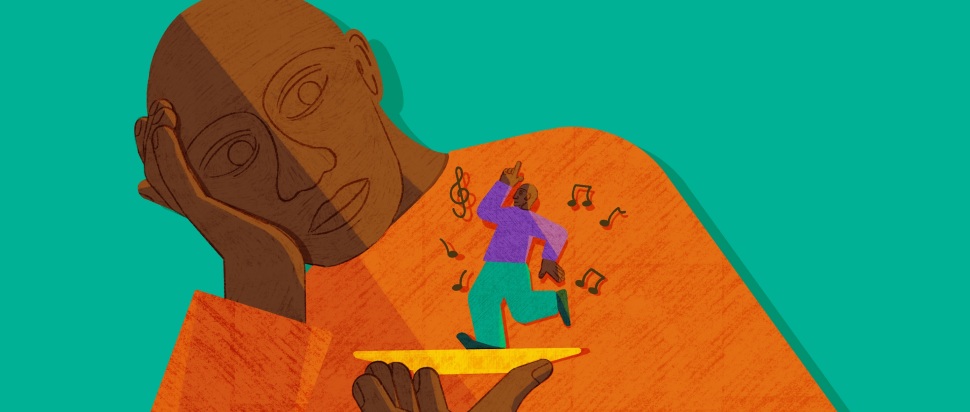Musicality, desire and Blackness in Caleb Azumah Nelson's Small Worlds
Caleb Azumah Nelson's remarkable sophomore novel Small Worlds is an investigation into music as a structuring force, and as a space where its characters can find security and expression
Not all pop songs are love songs. Not every major hit marshalls instrumentation, intonation and imagery to get you feeling keen and keenly feeling. That being said, very little else has the same potential to capture that tripwire sensation of falling in love as music does. Annie Ernaux gets it: ‘In songs one remains locked in desire,’ she writes in her memoir, Exteriors.
Caleb Azumah Nelson gets it, too. His debut novel, Open Water, grapples with what it means to be with someone – to be in love with someone, to be intimate with someone, to be honest with someone – and holds these meanings, whether complementary or counterfactual, in lyrical lockstep. The poetry of that preposition – with – lies not in its indexing of types of interaction or association, but in the way it speaks of proximity and posture. Azumah Nelson’s unnamed narrator – voiced in the second-person singular – is animated by his desires but, initially, a wariness to ‘breach a border’ in pursuit of his love interest.
Eventually, Azumah Nelson’s you becomes a we – the 300-odd miles between people collapsing into sighs akin to ‘percussive breaks’ – with all odds apparently slashed and all obstacles seemingly surmounted. This does not last, of course: the condition of Black life – as mapped through the narrator’s recollections, encounters and concerns – is one bound to the beat of existential threats that thrum through the city, of aches that redouble through the body, of apologies unsaid that leave you undone. It is taken, then, that truly being with and being true to someone else necessitates being able to be with and by oneself. The duet becomes a solo, but desire does not disappear.
In his second novel Small Worlds, Azumah Nelson builds upon this credo like a chorus supplanting the verse. Along with proximity and posture, place gains significance: ample attention is paid to Black British sound systems – those portable orchestras turned portals between home and the homeland – owing to their capacity for world-making and remaking a hostile world. Concurrently, there is an examination of where the novel’s protagonist, Stephen – a young Black South Londoner with musical aspirations – might go to find, lose, and return to himself. Place, in essence, becomes an organising principle – a geographic arrangement, certainly, but an inducement and an albatross, too. Meanwhile, the kinds of love featured range from feelings for a best friend that ‘excite and terrif[y]’ – that tripwire sensation once again – to devotion to a community besieged by the intolerable effects of gentrification. These kinds of love are transportive yet also fundamentally tethered to place. And music, as it turns out, is both their lock and their key.
Azumah Nelson’s characters are ‘forever improvising’: they rouse the energy within the spaces in which they gather – tracks by J Dilla, D’Angelo, DJ Gregory et al are wheeled up, leaving the crowd electrified, ecstatic, exultant – then meditate on all that they love and long to hear. Occasionally, these meditations occupy silences, are suggested through internal monologues or are, simply, gestural. But when vocalised – when desire, undisappearing, is given a voice – these meditations undeniably resonate, reflecting the Black musical roots and some of the allied techniques of modern-day pop.
In the beginning, there was a cry and, subsequently, a reply. The religious dimensions of call and response – the antiphonal musical pattern that can be traced, in large part, to age-old sub-Saharan African ceremonial rites – are far from obscured in Open Water and Small Worlds. The latter even begins with a Black church service. However, Azumah Nelson also makes it known that Stephen is more likely to experience ‘something spiritual’ in the clammy palm of a moshpit than within striking distance of a pulpit. But praise be as praise is: even as Azumah Nelson shifts this technique away from its dogmatic origins and toward straight-ahead self-expression, both novels still take the promise of faith seriously. Small Worlds goes as far as to establish this in relation to place, proximity and posture: Stephen’s mother, Joy, attributes her deliverance from the gloom of ‘waiting’ and entrance into a fully-realised life – albeit one lived as a bridge between the UK and Ghana and, more often than not, loved ones at odds – to a faith ‘h[eld] close’ and to tears shed for want of reprieve. A cry in want of a reply.
In the end – after the novel’s litany of devastations reaches its crescendo – Azumah Nelson reveals Small Worlds to be, perhaps, closer to choreography than to musical composition. Parallel movements through time – choices made by a son mirroring those made earlier by a father – recur like steps in a routine. Other symmetries extend back to the novel’s overture-turned-refrain – ‘Since the one thing that can solve most of our problems is dancing’ – which two-steps with Hanif Abdurraqib’s remixed essay collection A Little Devil in America. These references and round robin manoeuvres – reflections of techniques, such as sampling and looping, foundational to contemporary Black musical traditions – are an embrace. They confront, they consolidate, they comfort. Not all dances are driven by ardour. Sometimes relief, sought and secured, is enough.
Small Worlds is out on 11 May with Viking Books
